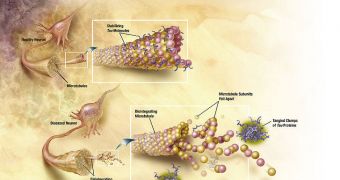Investigators at the Mount Sinai School of Medicine have found that chemical compounds in grape seeds can protect the brain against the onset of Alzheimer's disease, and also stop the progress of the condition, if it has already begun evolving.
Grape seed polyphenols contain natural antioxidant chemicals. In a new study conducted on lab mice, the experts learned that administering them to the lab rodents was an effective means to preventing the onset of the neurodegenerative disorder in predisposed animals.
Researchers behind the new study even managed to figure out how the substances act to provide this effect. They say that the antioxidants prevent the production of a specific form of beta-amyloid peptide.
Several studies have already linked this molecule to the onset of Alzheimer's. Excessive accumulations of beta-amyloid in the human brain can lead to impaired cognitive functions, loss of memory and so on.
In order to determine the efficiency of the grape seed compounds, investigators genetically engineered a strain of mice that was prone to developing the neurological condition. They then divided the animals into two groups, one that received the grape seed extract, and another which didn't.
The study team was coordinated by lead researcher Giulio Maria Pasinetti, MD, PhD. Details of the work were published online in the latest issue of the medical Journal of Alzheimer’s Disease.
After the treatment was applied in the study group, beta-amyloid*56 concentrations were found to be way lower than in the control group. This form of the peptide was demonstrated in past studies to play a clear role in promoting memory loss.
The new results certify past results, which indicated that people would do well to consume a glass of red wine each day, in order to protect against the cognitive decline caused by Alzheimer's disease.
“Since naturally occurring polyphenols are also generally commercially available as nutritional supplements and have negligible adverse events even after prolonged periods of treatment, this new finding holds significant promise as a preventive method or treatment, and is being tested in translational studies in Alzheimer’s disease patients,” Pasinetti says.
If researchers plan to turn this investigation into a practical cure, they still need to find a biomarker that would indicate which person is at higher risk of developing the condition. While taking supplements is recommended for anyone, at-risk people would need to get shock doses of the compounds.
“It will be critical to identify subjects who are at high risk of developing Alzheimer’s disease, so that we can initiate treatments very early and possibly even in asymptomatic patients,” the team leader says.
“However, for Alzheimer’s disease patients who have already progressed into the initial stages of the disease, early intervention with this treatment might be beneficial as well,” she adds.
“Our study implicating that these neurotoxins such as beta-amyloid*56 in the brain are targeted by grape-derived polyphenols holds significant promise,” Pasinetti concludes, quoted by PsychCentral.

 14 DAY TRIAL //
14 DAY TRIAL //